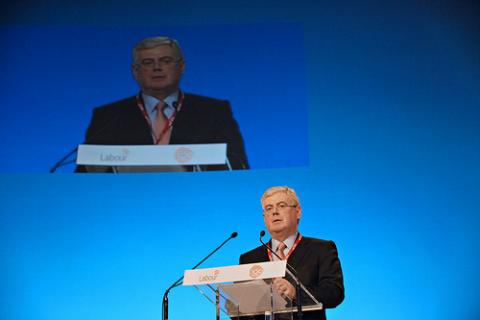How Gilmore could have spelled out Labour's dilemma

Over the last 15 years Labour never saw its role as arguing for radically different politics, preferring to prioritise a return to government with Fine Gael. By Vincent Browne.
Eamon Gilmore's speech to the Labour Party conference last night could have been more plausible and, maybe, ultimately more electorally satisfying than the one which he delivered. (As this is being written prior to the delivery of the speech, I am assuming he adhered to the conventions of leaders' addresses at such gatherings, with the usual triumphalism, exaggerations and hype.)
Such a speech might not have stirred the faithful - still less the faithless - and there would have been none of the rapture which these addresses usually evoke.
But it would have been a speech which acknowledged the position that Labour is in, both politically and ideologically. It also would have immunised the party from the embarrassment arising from the contrast between what Labour said (and says), and what Labour does.
The speech might go something like this:
"Labour continues to believe in a radical restructuring of Irish society, involving a substantial redistribution of wealth, income, power, influence, status and welfare, and we hope that circumstances will come about which will enable significant progress towards that ideal.
"But, realistically, in our present circumstances, there is no possibility of realising that objective because there isn't support for that ideal electorally.
"In the meantime, Labour has the option of posturing on the sidelines, as Sinn Féin and the United Left Alliance are doing, or doing what it can to minimise the impact on vulnerable communities of the enforced austerity that arises from previously reckless policies, the imposition of the bank debts on the Irish people, and the terms of the IMF/EU loan facility that enables the state to continue to provide basic services.
"It is claimed, with justification, that the measures we are required to enact in government have a detrimental impact on the poorest in our society. This would be a cause of shame for the Labour Party, if the alternative were not even more detrimental to the interests of the most vulnerable.
"For instance, it is likely that, were Labour not in government, the basic rate of social welfare would be cut. It is also likely that there would have been cuts across the board in public sector pay.
"In that context, it is relevant to point out that 25% of the 428,845 public servants are paid €20,000 or less, 5% are paid €40,000 or less and only 4% are paid more than €100,000. My colleague, Brendan Howlin, provided this information in answer to a Dáil question on 25 October last.
"Yes, it is awful that we have to participate in decisions that affect single mothers, community employment schemes, young unemployed people, older people via the cuts in the fuel allowance, and those hit by cuts in education and health. Yes, the government could have avoided these measures - for instance, by increases in income tax. But Labour does not have a majority in the Dáil, or a majority in cabinet. And these measures, however deplorable, are preferable to the measures that would have been enacted had Labour remained out of government.
"We had expectations before the last election of being able to achieve a significant writedown of the bank debt that has been inflicted on the state. While there has been a welcome reduction in interest rates and a deferral of some of the monies owed on the promissory notes, we have been unable to achieve a writedown in the debt.
"This is because of obduracy on the part of EU institutions, an unwillingness on the part of our EU partners to risk the financial fallout that might accrue from a writedown of any debt - in addition to the writedown of Greek debt - and, frankly, an unwillingness on the part of our partners in government to make a major issue of this at EU level, for reasons they believe to be strategic.
"However, one thing is certain: were Labour to leave government, the position on the debt would not be improved, and the alternative budgetary measures that I have outlined would be a central part of a new government's strategy.
"So, yes, we could resign from government in a 'principled' assertion of socialist ideals, and that might be electorally advantageous to us. But where would it leave those dependent on us to mitigate policies that would further devastate their lives and livelihoods?"
This is, as I understand it, the rationale of Labour's acquiescence in measures that might be viewed as anathema to Labour and, given the prevailing circumstances, I think it is not dishonourable.
But Labour has had a part in creating the prevailing circumstances, particularly the circumstances of the prevailing political culture, that have fostered the conviction that taxation is close to theft, and a strong belief in "entitlement" to what one "earns".
That has weakened the sense of social solidarity, even the idea of society, and has devalued the notion of equality in any way, other than as a formality.
Labour never saw its role over the last 15 years as arguing for radically different politics, preferring to prioritise a return to government with Fine Gael.
Not that the "far left" is at all serious about these ideas either - and one would also wonder whether Sinn Féin's priority is simply to get into office. {jathumbnailoff}
You can read the full text of Eamon Gilmore's real conference speech here.
Image top: The Labour Party.
